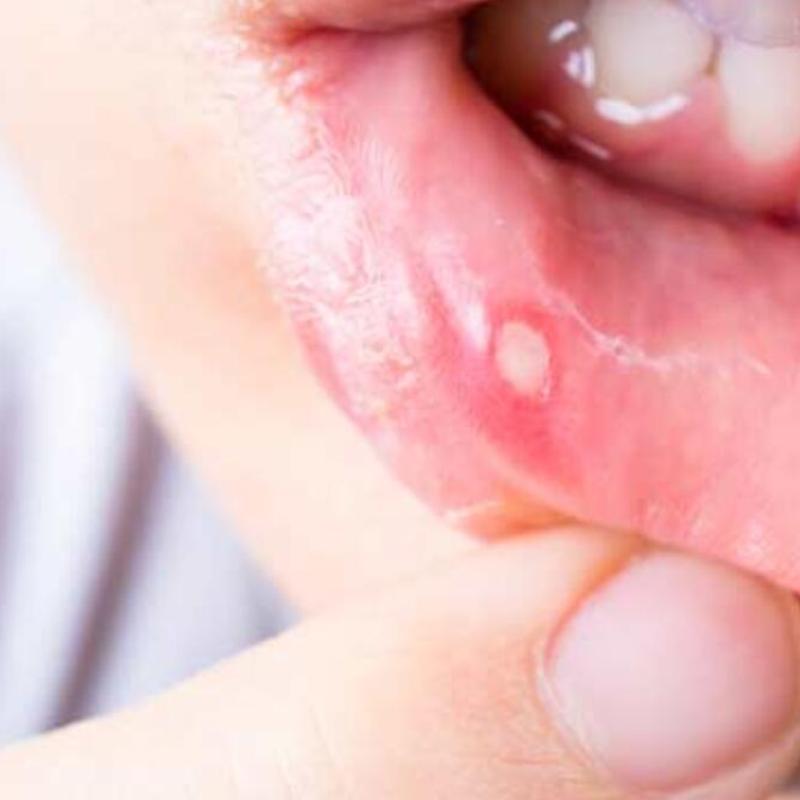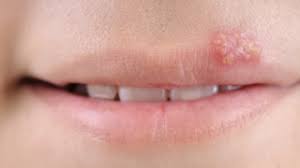
Aphthae And Herpes
Aphthae are very painful ulcerated lesions surrounded by a pale yellow-red halo in the mouth, often on the cheek and lip mucosa, on the tongue, soft palate, pharynx, gums. 18-20% of the society is faced with more or less aphthae problem. It is more common in women. Although aphthae usually watch as one, it can be seen in several regions at the same time.
A lot of research has been made to define the reason for the accruement of the Aft. However, although many factors have been determined that accelerate the formation of aphtha and worsen its course, the reason for its occurrence has not been determined exactly.
Therefore, it is possible to talk about factors that accelerate the formation of aphthae and delay its healing.

Which factors are important in formation of aphta lesion?
Stress
Today, stress, which is considered among the causes of many diseases such as migraine, high blood pressure and gastritis, is one of the most important causes of aphthae.
Premenstural tension (premenstrual period) is also one of the factors that accelerate the formation of aphtha in women.
Foods
Foods that can irritate the oral mucosa such as citrus fruits, vinegar, pickles, potato chips, salty and spicy snacks are among the important factors that accelerate the formation of aphthae. In addition to these, black wheat, rye, barley, chocolate, hazelnut, shellfish, which may be allergic for some bodies, Foods such as soy, tomato, some eggplant, apple, fig and cheese accelerate the formation of aphthae.
Trauma
Cheeks, tongue, lip biting, irritation of hard foods and brushing teeth that are not soft and bumps caused by poorly adapted prostheses help to create a suitable base for aphthae.
Tooth paste
"Sodium lauryl sulphate" (SLS), which is added to toothpaste as a foaming agent to increase the cleaning properties, is an irritant chemical that increases the destruction of mucous cells. With this feature, SLS is a substance that directly affects the formation of aphthae.
Toothpastes containing less SLS (1.25%) are produced today, especially for people with aphthae problems. (Tom's of Maine Natural Toothpaste, Oral-B Sensitive Fluoride Toothpaste.)
Systemic Diseases
Behçet's Disease: It is a disease that manifests itself with many systemic symptoms such as genital ulcer, conjunctivitis, retinitis, leukocytosis, as well as recurrent aphthae in the mouth.
Recurrent aphthae can be seen with many malignant and autoimmune diseases.
Other Causes
It is known that habits such as vitamin B12 and iron deficiency, smoking, chewing tobacco are also important factors contributing to the formation of aphthae.
How is it treated?
Although aphthae are not treated, they usually heal spontaneously after 7-10 days. It is possible for those who have aphthous problem to have a more comfortable period when they apply one or more of the procedures listed below.
What should be done to reduce pain and shorten the recovery period?
Hot, acidic and irritating foods should be avoided. The aphthous area can be cleaned with cotton or gauze soaked in "2% hydrogen peroxide" solution.
A fine cream prepared from a mixture of water and carbonate can be applied on aphthae.
You can gargle three times a day with the solution obtained by adding half a spoonful of salt to half a glass of water.
Before meals, "xylocaine" solution or oral anesthetic creams can be applied to the aphthae area.
Oral creams such as "orabase", "Gly-oxide", "Cankaid", "Ambesol" to be applied on aphthae can be applied.
The "sucralfate" tablet can be dissolved in warm water and gargled.
Especially in the initial phase of the aphthae, gargling with the solution obtained by dissolving the "tetracycline" tablet in water prevents the overgrowth of the aphtha and reduces the pain.
Again, in the initial phase of the aphthae, applying a topical steroid "0.1% triamcinalone" or gargling with a steroid gargle "betamethasone syrup" prevents the aphta from overgrowth and reduces pain.
"Chlorhexadine" mouthwash shortens the healing period.
A mixture of 12,500 units of "nystatin", 1.25 mg of "diphenhydramine", and 0.25 mg / m of "hydrocortisone" prepared with "tetracycline" syrup can be used as a 'shotgun' solution.
Differences between AFT (canker sores = mouth ulcers) and FLY (fever blisters = cold sores)
Aphthae and herpes can be confused with each other because they usually show the same symptoms. However, there are several fundamental differences between them:
Aphthae
1. It definitely occurs in the mouth.
2. It is not contagious.
3. Viruses do not cause aphthae to form.
Pale
1. It starts as blisters with water inside.
2. Although they are rarely in the mouth, they usually occur outside of the mouth. Although aphthae can occur in all areas in the mouth, herpes usually involve inactive areas such as the roof of the palate in the mouth.
3. It is contagious.
4. It is caused by viruses.
What are the Symptoms of Herpes?
It becomes evident before the cold sore appears (0-24 hours in advance); tingling, itching, burning and tingling are felt. This is followed by the redness of the area, swelling, and then the emergence of fluid-filled bubbles. These bubbles cause pain and anguish while talking, laughing, eating and drinking. Over time, it dries up, cracks, leaks and turns into an ugly wound that distorts the image by opening.
How Is It Transmitted?
Herpes are contagious between the preliminary symptoms and the time of open wound closure. Towels, glasses, forks, spoons, etc. used by a person with cold sores. It is transmitted from objects and by kissing a person with herpes. People usually first meet with herpes virus (Herpes simplex) when they are young (0-5 years old). As a result of the "Loving" kiss of a family member with herpes, the herpes virus enters the body. It often appears as small rashes that are not noticed; the inside of the mouth, gums and lips become infected. However, it can be seen as a serious infection in some sensitive bodies.
Attention! Herpes is Contagious!
Herpes should not be touched. If touched, hands should be washed very well.
Ladies should be especially careful while removing their makeup. Eyes must not be touched.
Especially babies, children and other people should not be kissed.
Towels, glasses, forks, spoons and so on. items should be separated and not allowed to be used by others.
Materials used while eating and drinking should not be shared, especially with children.
It should not be played with the crust of cold sores and sores. (While the herpes virus is transmitted to the fingers, the cold sores are also infected with other microbes.)
Why Does It Recur?
Herpes virus (Herpes simplex) enters and settles in the pus node in the area after entering the body and making the first infection, and this unwanted guest reproduces and herpes occurs when the body is weak.
Stress
Extreme tiredness, insomnia
Excessive sunlight and UV rays
Other infections
The virus may become active in situations such as menstrual period and pregnancy.
Can it be controlled?
First of all, it is necessary to avoid situations that cause herpes to recur. For example, if it develops due to stress; Learning relaxation techniques to reduce our stress. If fatigue and insomnia are the causes; rest and sleep well. If the sun causes; For lips, it is necessary to use protective cream or sun oil with a high protection factor and protect the face from the sun with a hat. Despite all the precautions taken, herpes can still recur.
When preliminary symptoms (tingling, itching, burning, tingling) are felt, it is necessary to apply an antiviral herpes cream at short intervals. The cold sore will either never come out or even if it does, it will be mild.
How Is It Most Effectively Treated?
Some substances and drugs have previously been used to reduce the discomfort caused by herpes:
Alcohol and antiseptic drugs prevent the development of bacterial infection on the cold sore.
Pain medication; It reduces the pain caused by herpes.
Applying ice; Pain can be reduced
However, antiviral herpes creams used in effective treatment today affect the herpes virus (Herpes simplex) by passing through the skin and prevent them from damaging the skin.
